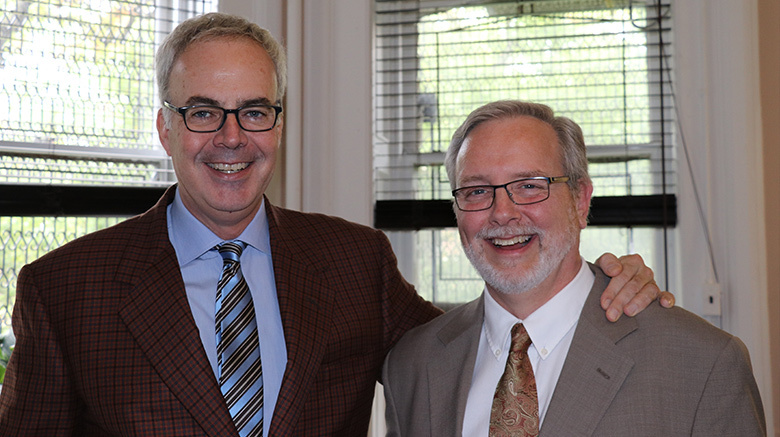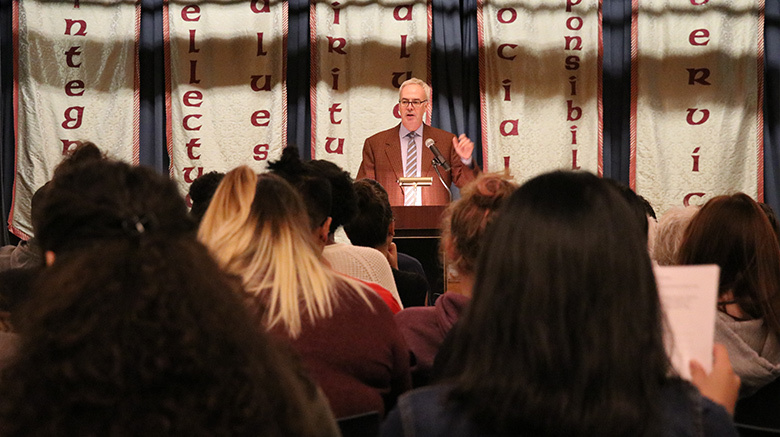SJC Brooklyn celebrated the pioneering intellect of the College’s founding class by welcoming a noted scholar Oct. 12 to present the College’s annual Founders Day Lecture.
Thomas Landy, Ph.D., professor of sociology at Holy Cross and the founder of Collegium, delivered a lecture entitled, “Learning to Behold, Beholding to Learn” in the Tuohy Hall Auditorium.
“The act of founding a college in the times the Sisters did was rather bold,” Dr. Landy said, referring to the Sisters of St. Joseph. “Think about it: when the College was founded in 1916, World War I, the Great War, was going on. Only three percent of all Americans went to college, and women were half as likely to do so as their male counterparts. Yet, these bold women, with their wild dreams, bound together and went forth, and this college is the result of those efforts.”
He then went on to elaborate as to why these nuns founded a college, as opposed to teaching in high schools or establishing vocational institutes, both of which were seemingly more relevant and important in those days.
Think about it: when the College was founded in 1916, World War I, the Great War, was going on. Only three percent of all Americans went to college, and women were half as likely to do so as their male counterparts. Yet, these bold women, with their wild dreams, bound together and went forth, and this college is the result of those efforts.”
“The formation of a college came out of the Sisters’ spiritual worldview, which considered higher education to be holy work,” Dr. Landy said. “They believed in, and practiced a worldly spirituality similar to that of the Jesuits; they believed that God was a part of everything and in all things, and that through scholarship they would be able to bring out the beauty and goodness in all of his creations.”

Thomas Landy, Ph.D., professor of sociology at Holy Cross and the founder of Collegium, with Michael J. Hanophy, Ph.D., SJC Brooklyn’s interim executive dean and professor of biology.
This commitment manifested itself in a number of the decisions that the Sisters of St. Joseph made in the formative days of the College. Like the Jesuits, the Sisters of St. Joseph’s were not interested in sequestering themselves away from the world; rather, it was imperative that the College be one with people and be embedded in the community. He then went on to discuss the concept of “sacramental imagination” and how curiosity and being cognizant of our own imperfections enables individuals to behold the majesty of God’s creation and the inherent holiness of this task.
Through engaging others with both good deeds and ideas, “God’s creation comes to the surface and sacramental imagination flourishes,” he said.
When discussing the challenges in being fully attentive and focusing in today’s hyper-connected, digitally-enabled world, Dr. Landy inquired: “We are all under incredible demands; how do you create space to be reflective? Are we able to pay attention to anything deeply, and how has our inability to do so impacted us?”
To combat this, Dr. Landy evoked the imagery of sanctuary and described how important it was for individuals to form a deliberate place to pay attention and engage what the world has to offer. Through doing so, he asserts, we can follow the call of the Jesuit poet Hopkins and feel “the joy of discovery” and experience the sacred.

